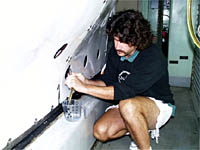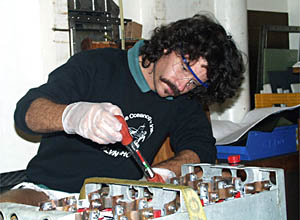 BLee
drains oil from Alvin’s systems after the dive to
check for trace amounts of water. After each dive, all of Alvin’s systems
are thoroughly checked and readied for the next dive.
BLee
drains oil from Alvin’s systems after the dive to
check for trace amounts of water. After each dive, all of Alvin’s systems
are thoroughly checked and readied for the next dive. Question:
What are your main responsibilities as a pilot and member of the Alvin at-sea
operations group?
BLee:
My
first responsibility is to take care of Alvin’s batteries,
which are actually souped-up golf-cart batteries. Alvin uses a lot of
them. There are 120 two-volt batteries hooked together to provide enough power
for Alvin to dive for nine hours. The batteries are important, because
if you don't have power, you can't go anywhere. I am also the electronics section
leader for the Alvin at-sea group. I oversee the Alvin ETs (Electronic
Technicians) and the maintenance of all the electrical equipment in the sub,
including the installation of different types of science equipment. I am also
the training coordinator for the entire Alvin group, so it is my job to
integrate newcomers into our team, help them study and learn about Alvin,
and make sure they get practical experience so they can become pilots. I also
help them learn about what the scientists who use Alvin to get data want.
Question:
Did you like school when you were a kid? Did you know what you wanted to be when
you grew up?
BLee:
School was always easy for me. Even though I never studied much, I did OK. But
I was bored most of the time. I never really understood how all the stuff teachers
tried to teach us would help me figure out what I wanted to do for a living.
I finished high school and went to Wake Forest University, but I just didn't
find any subject that really interested me. So I stopped after about a year-and-a-half.
I went to live with a cousin and helped him refurbish a house. That taught me
that I didn't want to do that for a living.
One day, I happened to walk by a US Navy recruiting office. After talking with
my Dad about it, I decided to join the Navy. My idea was to become a cook. After
taking a bunch of tests, the Navy told me that I should do something technical
and learn different skills. After two years, I ended up being one of the people
responsible for the nuclear reactors on the submarine USS Memphis. In the Navy,
I liked going to school because everything that I was being taught I could use
and apply in my work. That was the perfect match for me.
After I left the Navy, I got a job working for the Newport News, Virginia, shipyard
that was responsible for refueling the nuclear aircraft carrier USS Enterprise.
I started as just one of the low-level technicians. In only 13 months, I became
a chief refueling engineer. That was a record for advancement to that position.
But I was also looking for a new challenge. All the guys I worked with came from
Massachusetts. They were the first ones to tell me about WHOI and Alvin.
Question:
When did you start working for WHOI and the Alvin Group?
BLee:
After my co-workers at the shipyard told me about WHOI and Alvin, I decided
to call and find out if they needed an electrical engineer. After waiting several
months, I finally got the call and was offered a job in the Alvin Group.
I went directly to Bermuda in the late spring of 1993 to help complete Alvin’s overhaul,
start learning about the sub, its electrical and power systems, and study to
become a pilot.
Question:
What do you like most about being an Alvin Pilot?
BLee:
I get to be involved in really interesting science projects with many different
scientists, yet I don't have to write the proposals. I get a lot of satisfaction
from helping scientists get their data and helping them make the instruments
they invent work on Alvin. When scientists tells me what they want to
do, I love the challenge of figuring out how to do it. I get great satisfaction
from that process - being a deep-sea diagnostician who both solves problems that
happen with Alvin equipment and helping scientists with their gear.
I also like being able to tell scientists and pilots where all the great spots
are on the seafloor for collecting rocks or animals. There are a few places that
scientists have been going back to for over 10 years. Because I've been with
the group for so long, I've been to these places many times.
I also help the newer pilots navigate around the bottom. When they are unsure
where the vent site is, I can usually tell them where to head. I like to think
of myself as an expert deep seafloor guide, taking biologists and geologists
to some of the most fantastic places on Earth.
Question:
What do you like most about being out at sea? What do you like least?
BLee: I
come from a nautical family. When I'm not on board RV Atlantis, I like
to spend time on the Outer Banks in North Carolina. So I love the sea and observing
sea life. But I love working and taking care of Alvin. I enjoy making
things work better on the sub. I always miss my daughter. I hope that she will
be able to sail with me when she's older so she can share some of my experiences
first hand.
[Back
to top]
|


 BLee
checks the fluid levels in Alvin’s batteries.
BLee
checks the fluid levels in Alvin’s batteries.